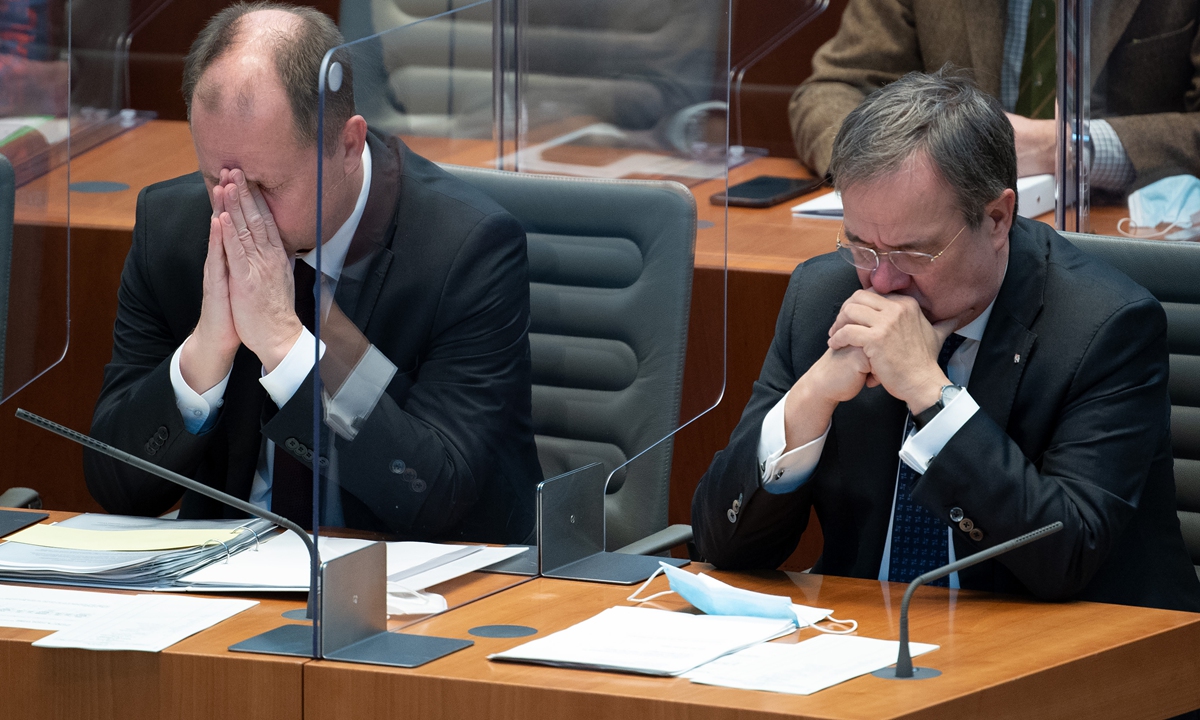Merkel’s potential successor leans toward US, adds uncertainties to China-Germany ties

Armin Laschet (right), Minister President of North Rhine-Westphalia and Leader of the Christian Democratic Union, and his deputy Joachim Stamp at the state parliament of North Rhine-Westphalia in Duesseldorf in April. Photo: AFP
As Angela Merkel, Germany's long-serving chancellor, enters the last eight weeks of her term, German candidates, including her potential successor Armin Laschet, have called for a stronger demarcation between Europe and China and a close alliance with US, which Chinese experts view as an uncertainty in the special election period rather than a sign that Berlin will join the Washington camp, as Germany's policy is always based on its own interests.
Along with Defense Minister Annegret Kramp-Karrenbauer and the German government's transatlantic coordinator Peter Beyer, Laschet, the chief of Merkel's Christian Democratic Union (CDU) party and chancellor candidate, said Europe needs the capacity to act.
"Only then will we be a strong partner for our transatlantic friends," Laschet writes for commemorative publication "Forging the New West," which is available on Handelsblatt and will appear next week.
He also said that the US and EU should reach some agreements on digitalization and new technologies, as China is viewed not only as a competitor and negotiator, but also a "system rival."
The other two candidates attacked China on the Belt and Road Initiative and human rights issues, saying it is naive to be neutral on China-related questions.
Experts reached by Global Times said that under the pressure of an election and amid the China-US confrontation, unfriendly remarks from candidates do not mean a major policy shift. The presence of China issues in the German election reflects the importance of the ties between the two countries.
Sun Keqin, a research fellow at the China Institutes of Contemporary International Relations, told the Global Times on Tuesday that confrontational rhetoric from German politicians is alarming, but it does not mean the disappearance of the cooperative dimension, nor does it mean that Berlin will join the Washington camp.
Germany and the EU cannot completely follow the US' view of China as its rival, aside from values and ideology, some analysts said.
Sun hopes that the future German leader will have the sober mind and wisdom to assess the weight of China in Germany's interests. But the new chancellor in post-Merkel era is very likely to take a tougher line on China, but without derailing Merkel's overall path, he said.
The interests of Europe and China are reflected in economic and cultural cooperation as well as global governance… Europe cannot afford to sever its ties with China, Sun noted.
Witnessing the US' vain effort to form an anti-China alliance in US-EU and G7 summits in July, leaders of Germany and France expressed support for the Comprehensive Agreement on Investment amid rising uncertainty over the massive, hard-fought agreement, and for cooperation in other areas.
Merkel said that Germany hopes that the EU-China investment agreement will be approved as soon as possible, Xinhua reported.
Feng Zhongping, director of Institute of European Studies of Chinese Academy of Social Science, told the Global Times on Tuesday that German politics is diverse, whether it is pro-US or China-friendly, its policy is always based on Germany's interests.
The pre-election voices and post-election practices often diverge, Feng said.
There are differences and no consensus on the China topic within the EU, and the same is true within Germany, said Feng, noting that the situation shadows uncertainty.
Laschet is favored to become Germany's next chancellor after Merkel's office term ends in September.
Based on a recent poll from German broadcaster ZDF, 34 percent of Germans think Federal Finance Minister Olaf Scholz should be the next chancellor. Laschet received 29 percent support.
In a press conference organized by the BDI industry association in June, Laschet said he supports the German government's China strategy.
"We must talk about our concerns (on human rights) but there is no need to turn our China policy on its head," Laschet said, according to a Reuters report.
"We should be on guard against German politicians' compromise with the US, which will increasingly affect the basis of China-Germany cooperation… Neither side wants to see the bilateral relationship slide," Sun said.
Whoever takes office, China-German relations are likely to go through an unpleasant transition in the post-Merkel era amid US pressure on the human rights issue and competitive areas, the expert said.
""If a China-friendly politician takes office, the transition period will be relatively short," Sun said. "But there will still be difficulties."






